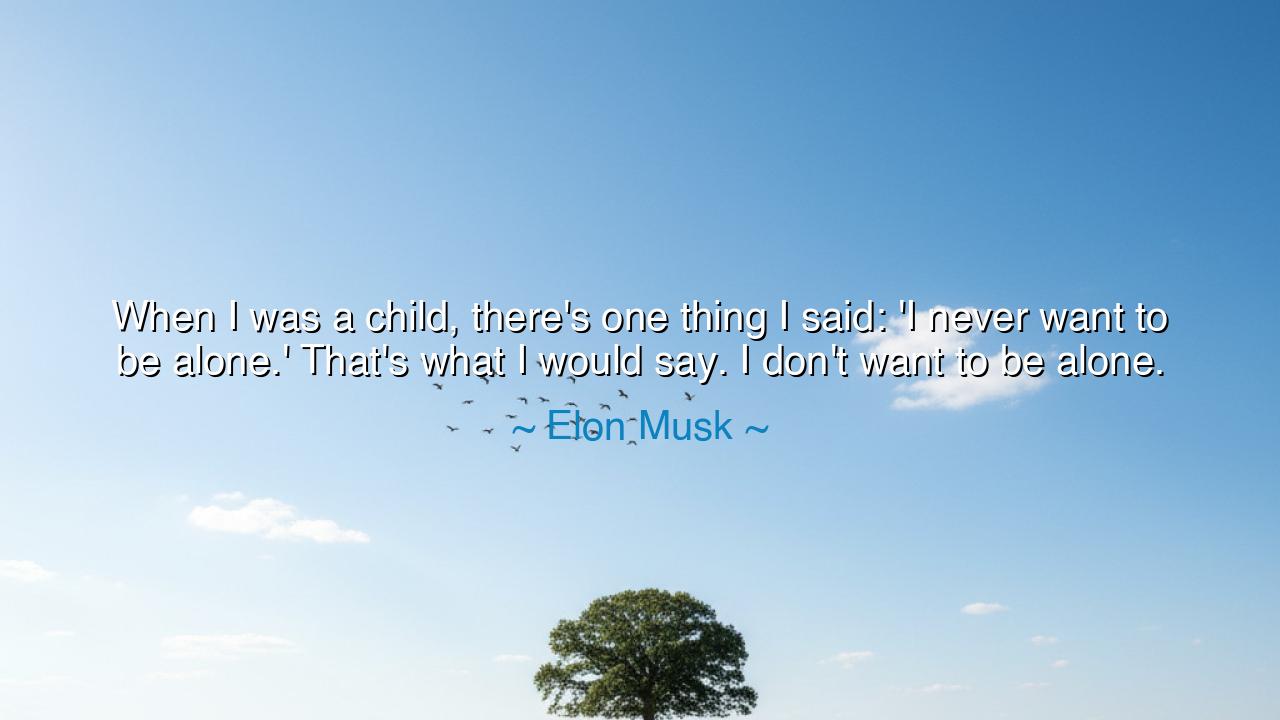
When I was a child, there's one thing I said: 'I never want to be
When I was a child, there's one thing I said: 'I never want to be alone.' That's what I would say. I don't want to be alone.






In the haunting and human words of Elon Musk, the visionary who has reached beyond the stars yet speaks with the vulnerability of a child, we hear a confession that transcends wealth, power, and invention: “When I was a child, there's one thing I said: ‘I never want to be alone.’ That’s what I would say. I don’t want to be alone.” This is no boast of a conqueror, but the quiet cry of the soul, as ancient as humanity itself—the yearning to belong, to be understood, to be seen not merely as a creator, but as a companion in a vast and often indifferent universe. It is the voice of the man beneath the myth, the human beneath the engineer, reminding us that even among the stars, what we seek most is connection.
Elon Musk, a name synonymous with innovation and ambition, is often portrayed as a figure of relentless intellect and restless drive—a man who builds rockets and electric chariots to reshape the destiny of humankind. Yet beneath this titan of technology lies the same fragile heart that beats in every human chest. Musk, born in South Africa, endured a lonely and painful childhood, marked by isolation, bullying, and a deep hunger for understanding. His confession, therefore, does not emerge from weakness, but from memory—from the wounds of solitude carried forward into a life of staggering achievement. The boy who once whispered, “I don’t want to be alone,” became a man who filled the sky with satellites, as if to ensure that no corner of the world—or the heavens—was beyond communication.
In this simple admission lies a profound truth about the human condition. From birth, we are not made for isolation. The philosophers and poets of every age have known this. Aristotle called man a “social animal,” fashioned to live in community. Even the saints and sages who sought solitude in deserts or mountains did so not to flee humanity, but to better understand it—to reconnect with the divine that binds all souls together. Musk’s longing echoes this same eternal truth: that loneliness is not just the absence of company, but the absence of resonance—the lack of another heart that beats in rhythm with one’s own.
History offers us many mirrors for Musk’s yearning. Consider Nikola Tesla, another genius whose mind burned brightly but whose heart often wandered in darkness. Tesla, the father of electricity, lived much of his life alone, haunted by the brilliance of his thoughts and the ghosts of his solitude. He loved humanity in the abstract but found few who could love him in return. He once said, “Be alone, that is the secret of invention,” yet in his final years, surrounded only by the hum of machines and the whisper of pigeons, even he felt the weight of his own solitude. Musk’s confession, though born in another century, is the echo of Tesla’s silence—a reminder that intellect may conquer nature, but it cannot conquer loneliness.
And yet, Musk’s words are not merely lamentation—they are also longing transformed into purpose. The man who feared being alone has built bridges of connection across the world. His companies are not merely businesses; they are expressions of his deep desire to unite humanity—to make the Earth sustainable, to make Mars habitable, to ensure that the human spirit never perishes in isolation. Beneath the steel and circuitry of his creations lies the beating heart of that same boy who once wished not to be alone. His rockets, in truth, are prayers in motion, sent into the heavens in search of kinship among the stars.
There is a paradox in his life, as there is in all human lives: that the ones who most fear loneliness often create the very worlds that others inhabit. The artist, the inventor, the thinker—they all work from solitude, yet their labor binds the world closer together. In Musk’s words, we glimpse the eternal struggle between isolation and communion, between the solitary mind and the collective soul. The fear of being alone, when faced with courage, becomes the fire that drives creation. It is loneliness transmuted into legacy.
The lesson, then, is both tender and fierce: do not despise your loneliness, but listen to it. Within that ache lies the seed of your greatest work. Let your longing for connection make you kind; let it make you brave. Build bridges, not walls; reach outward, even when the world feels far. For though each of us must walk our own path, no one was ever meant to walk it unseen. Musk’s confession is a mirror held before us all: the reminder that no achievement, no triumph, no conquest can replace the warmth of a shared heart.
So remember this, O traveler between earth and sky: even the man who dreams of Mars carries within him the child who once feared the dark. Elon Musk’s words are not only about loneliness, but about love—the deep, inescapable need to belong to something greater than oneself. Let them remind you that the greatest journey is not the one to other planets, but the one that leads from one heart to another. For in the end, no one truly wishes to be alone—not the child, not the genius, not even the stars themselves, which shine most brightly when seen together.






AAdministratorAdministrator
Welcome, honored guests. Please leave a comment, we will respond soon